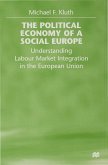This book examines the manner in which the EU affects employee relations systems in economically peripheral European countries, specifically Ireland and Hungary. It asks whether the EU offers peripheral countries the opportunity to modernise their industrial relations. The EU dynamically promotes core-like employee practices, and national actors energetically attempt to implement the prescribed initiatives, yet little success has been achieved in modernising production techniques in peripheral economies. O'Hagan argues that the EU implements an unofficial development policy which it pressurises States to adopt. These initiatives amount to the frequently referred to European Social Model (ESM), which, she argues, can cause difficulty for policy makers because it is ill-defined, vague and contradictory.
Bitte wählen Sie Ihr Anliegen aus.
Rechnungen
Retourenschein anfordern
Bestellstatus
Storno








